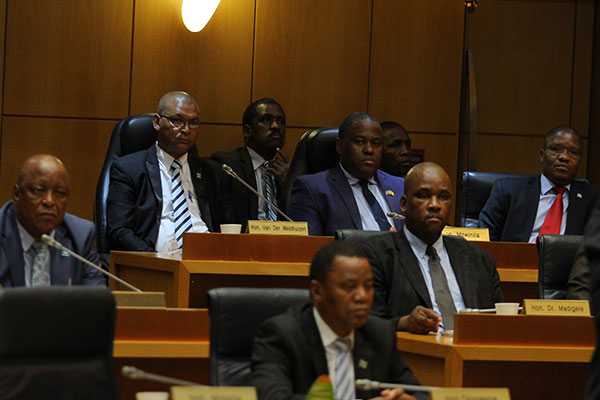MPs okay Data Protection Bill with reservations
Members of Parliament have welcomed the Data Protection Bill presented by Minister for Presidential Affairs, Governance and Public Administration Nonofo Molefhi this week.
The MPs further called for enactment of other laws such as Freedom of Information Act. The minister was also cautioned about abuse of power by government to access individuals’ personal information.
Presenting the Bill Molefhi stated that the Constitution of Botswana guarantees at Section 9, the right to privacy as one of the fundamental rights and freedoms of an individual. Access to services from service providers often results in the service providers compiling personal data, some of which is sensitive personal data, he said. The minister told Parliament that this Bill seeks to regulate the protection of personal data and ensure that the privacy of individuals in relation to their personal data is maintained.
“Personal data is information that relates to an identifiable individual, which individual can be identified directly or indirectly by reference to an identification number or to factors specific to the individual’s physical, physiological, mental, economic, cultural or social identity. “On the other hand, sensitive personal data is, personal data relating to an individual, which reveals among other things, his or her racial or ethnic origin, political opinions, religious beliefs, sexual life and personal financial information.
The main object of the Data Protection Bill is to protect all personal data and to provide for instances where it may be processed,” he explained. Molefhi added that the Bill further provides for security safeguards required in the processing of data and establishes an Information and Data Protection Commission whose main function is to protect the personal rights of individuals with regards to their personal data.
Debating the Bill MP for Gaborone Central Dr. Phenyo Butale observed that in most instances the Data Protection Laws are often enacted after a country has enacted a Freedom of Information Law. He explained that the reasoning for this is that data protection is often misconstrued by some Governments more especially Governments that like secrecy over transparency, they always think that Data Protection Laws are secrecy laws.
Dr Butale said the chronology is made in this way so that “as you promote transparency, you then have a legal instrument that protects personal information”. Samuel Rantuana of Ramotswa said even though he welcomes the Bill, data protection breaches are not well articulated. “If the breaches are done (sic), what are we going to do? There should be clearly laid out data protection breaches. This data protection should not be only against private or other individuals. Are individuals protected against the Government that can use this information to harass its own people?” asked Rantuana.
He said the law once enacted should not be like the one used by Ministry of Nationality, Immigration and Gender Affairs which has created problems where people were being traced back to their grandparents because they come from Zimbabwe and South Africa. “We did not let them renew their Omang and that is very wrong,” the legislator said. Rantuana stated that the Government can harass its own people from their individual data.
MP for Palapye Moisiraela Goya said one of the good attributes of the Bill is that it talks about setting or establishing an Information and Data Protection Commission. Goya pointed out that this Commission is meant to protect rights of individuals with regard to their personal details.
“If you look at the market today, if you go into shops and other outlets where they provide service, they use machines called speed points. These speed points are supplied or provided by banks to these merchants. These machines work through an Internet Service Provider (ISP) but the question is, how does one’s PIN get protected”? Goya who is also Assistant Minister of Investment, Trade and Industry stated that one does not know whether this PIN has not been shared with Internet Service Providers because it is the banks who supply these speed points to the merchants, so individual customers can do their transactions through these machines.
MP for Gaborone Bonnington South Ndaba Gaolathe pointed out that the legislation seems somewhat silent on the area of oversight, particularly oversight in relation to Parliament. According to Gaolathe there needs to be explicit reference to how there would be management of potential abuse, because the regulator will have powers to make decisions and grant permission for studies. “How do you have an oversight regime and dispensation, to ensure that at the overall level those powers are not abused? There is always reference to, ‘for security reasons we would not allow such data to be given to other authorities.’
There has to be an objective measure of what security reasons means, as it is done internationally. There are new threats to privacy and being able to enforce privacy, there are new issues of the extent to which technology allows you to interact so many times”.





